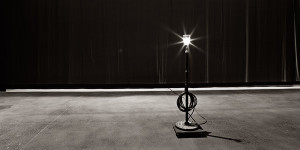Very Superstitious!
With the spirit of Halloween & Dia de los Muertos coming up this weekend, Cygnet would like to share some superstitions to be mindful of during your next visit to the theatre.
1. Hauntings: Ghosts haunt theatres and should be given one night a week alone on the stage.
To keep the ghosts of the theatre subdued, there should be at least one night a week where the theatre is empty, this night is traditionally a Monday night, conveniently giving actors a day off after weekend performances.
At Cygnet Theatre, Monday and Tuesday are when the theatre is dark, so Charlie, our resident ghost, gets an additional day to haunt the theatre. Lucky him!
2. Ghost Light: There should always be a light burning in an empty theatre to ward off ghosts.
 Conventionally, the light is placed downstage center, illuminating the space when it is not in use. This is to give ghosts like Cygnet’s Charlie enough light so that he can see, which keeps him at bay.
Conventionally, the light is placed downstage center, illuminating the space when it is not in use. This is to give ghosts like Cygnet’s Charlie enough light so that he can see, which keeps him at bay.
Another practical reason for a ghost light is the backstage area of a theatre tends to be cluttered with props and set pieces, thus someone who enters a completely darkened space is prone to being injured while hunting for a light switch.
It prevents the living from having to cut across the stage in the dark, hurting themselves and contributing to new ghosts for the theatre. It’s also known as the “Equity Light” or “Equity Lamp”.
3. Whistling: It is considered bad luck to whistle on or off stage, as someone (not always the whistler) will be injured.
Before the invention of walkie-talkies or “comms”, the cues for the theatre technicians (usually hired sailors) were coded whistles given by the stage manager. If one was whistling backstage it could call a cue before it’s due, which could have disastrous outcomes.
4. Saying Good Luck: To wish someone ‘Good luck’ before a show is bad luck.
It is considered bad luck to wish someone “good luck” in a theatre; the expression “break a leg” replaces this phrase. There are many theories on the origin of the term “Break a Leg”. The most popular? In the days of Vaudeville, companies would book more performers than could possibly make it onstage, but would only pay those who performed. Since the Renaissance, stage curtain legs have been used as part of the masking in proscenium theaters, which remain the most popular style of theater to this day. Thus, to make it on stage, one had to enter the line of sight of the audience or “break a leg”, to be paid.
5. The Scottish Play: Saying the word ‘Macbeth’ inside a theatre will result in extreme bad luck.
Theatre folk avoid saying the name of this play and only refer to it as ‘The Scottish Play’. If the name is spoken in a theatre, there is a cleansing ritual one can perform to rectify the mistake. The most popular way: the offender is required to leave the theatre building, spit, curse and spin around three times, before begging to be allowed back inside. Other variants include: Reciting a line from another Shakespearean work, brushing oneself off, running around the theatre counter clock-wise, or repeating the name 3 times while tapping their left shoulder.
There are several possible origins for this superstition. One of the most commonly held beliefs is due to the play’s infamous reputation as theatres in debt often produced it and it was used as a last attempt to increase sales, but the theatres normally went bankrupt shortly afterwards.
Other superstitious activities to avoid in the theatre:
- It is considered bad luck to give flowers to actors BEFORE the show.
- It is also bad luck to complete a performance of a play without an audience, hence the practice of “invited dress” allowing family & friends to attend the final dress rehearsal. Another way around this is to avoid saying the last line of a play.
- A company should not practice doing their bows until the final dress rehearsal.
- Peacock feathers should never be brought on stage. Actors associate this accessory with disasters on stage.
- Stemming from a concern over theft, real money and real jewelry shouldn’t be used on stage.
- A bad dress rehearsal means you will have a great opening night.
Speaking of ghosts, catch three very well known ghosts this holiday season with Cygnet’s new original musical, A Christmas Carol. Perfect for the whole family!
